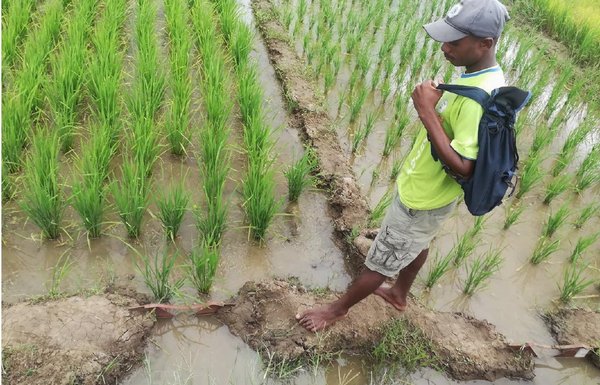- Share this article
- Subscribe to our newsletter
Water saving technologies in rice and cotton production: Experience from Helvetas
Under the lead of HELVETAS Swiss Intercooperation, a consortium of standard actors, large international, but also smaller domestic private sector companies and CSOs implemented a broad range of water saving technologies for irrigated rice and cotton production. The programme was funded by the Swiss Agency for Development and Cooperation (SDC), with relevant in-cash or in-kind contributions from participating actors. More than 80’000 farmers participated. Depending on the situation and the applied water saving techniques the water savings ranged from 5 to 92 per cent. A recent cost-benefit analysis revealed that this ecological gain corresponded with an economic benefit of in average 130 USD per farmer and year.
The following table summarises water productivity data and records taken from eight years of WAPRO implementation. The five techniques were applied in six different countries. Water savings refer to the comparison between farmers trained in the frame of WAPRO with farmers following the usual conventional practices.
Five techniques and related water savings
Technique | Crop | Application in | Minimal Water Savings (%) | Maximal Water Savings (%) |
Alternate Wetting and Drying | Rice | India, Pakistan, Myanmar, Madagascar | 9 | 92 |
Laser levelling | Rice | India, Pakistan, Myanmar | 8 | 26 |
Alternate furrow irrigation | Cotton | India | 18 | 89 |
Short furrow irrigation | Cotton | Tajikistan and Kyrgyzstan | 11 | 72 |
Drip irrigation | Rice and Cotton | India (rice), Pakistan (rice, cotton), Myanmar (rice), Madagascar (medicinal plant) | 5 | 78 |
The water savings are not only a result of agricultural extension and the adoption of technical solutions. Equally important is that there is demand for ecologically produced goods and very often organisational up and policy measures. In a nutshell the following advices prepare the ground for an increased water efficiency:
- Have an irrigation system management and Water User Associations (WUA) in place that ensure timely access to irrigation water
- Have a water stewardship in place
- Apply right timing and right volumes
- Elaborate technology packages and corresponding extension and guidance in a participatory manner
- Create a dynamic link with the applied standards.
Based on the eight years of WAPRO implementation, we can conclude that substantial water savings are possible if field-level and water stewardship actions are combined by all involved actors in order to obtain synergistic leverage. Among the involved actors are substantial private sector companies. About their involvement in WAPRO, lessons learned about the engagement of private partners in food systems we will report in a later print issue of Rural 21 in quarter four of 2022. Stay tuned!
About WAPRO
“WAPRO” is an eight-year project aimed at enhancing water productivity in the cultivation of rice and cotton, two of the most water-consuming crops globally. It is a joint undertaking of SDC, renowned private sector partners such as Mars and Coop, global platforms such as the Better Cotton Initiative (BCI), the Sustainable Rice Platform (SRP) and the Alliance for Water Stewardship (AWS), and numerous local private and civil society partners. The project consists of ten sub-projects active in six countries: India, Kyrgyzstan, Madagascar, Myanmar, Pakistan and Tajikistan. Helvetas has been mandated to coordinate project implementation through a “Push-Pull-Policy” approach. In its “Push component”, it has worked with 80,000 farmers to help them adopt water saving technologies. Through its “Pull component”, global as well as smaller domestic companies are now sourcing rice and cotton more sustainably. With its “Policy component”, the project has contributed to shaping global production standards, influenced national and sub-national policies to allocate scarce irrigation water fairly, and empowered thousands of farmers to claim their right to access to irrigation water via local water stewardship actions.
Jens Soth, Senior Advisor Commodity Projects. Contact: Jens.Soth(at)helvetas.org
Peter Schmidt, Senior Advisor Agriculture & Food. Contact: Peter.Schmidt(at)helvetas.org
More about WAPRO:
Joining forces to enhance water productivity | Global | Helvetas





Add a comment
Be the First to Comment